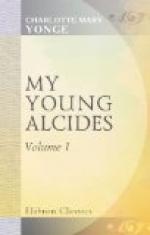One afternoon, when I was not well, I was going to send her with Colman, and Harold coming in upon her tempest of resistance, and trying to hush it, she declared that she would only go if he did, and to my amazement he yielded and she led him off in her chains.
He made no comment, but on the next Sunday I found him pocketing an immense parcel of sweets. He walked into the town with us, and when I expected him to turn off to his friend’s lodging, he said, “Lucy, if you prefer the old church, I’ll take Dora to the school. I like the little monkeys.”
He went, and he went again and again, towering among the pigmies in the great room, kneeling when they knelt, adding his deep bass to the curate’s in their songs, responding with them, picking up the sleepy and fretful to sit on his knee during the little discourse and the catechising; and then, outside the door, solacing himself and them with a grand distribution of ginger-bread and all other dainty cakes, especially presenting solid plum buns, and even mutton pies, where there were pinched looks and pale faces.
It was delightful, I have been told, to see him sitting on the low wall with as many children as possible scrambling over him, or sometimes standing up, holding a prize above his head, to be scrambled for by the lesser urchins. It had the effect of rendering this a highly popular service, and the curate was wise enough not to interfere with this anomalous conclusion to the service, but to perceive that it might both bless him that gave and those that took.
In the early part of the autumn, one of the little members of the congregation died, and was buried just after the school service. Harold did not know of it, or I do not think he would have been present, for he shrank from whatever renewed the terrible agony of that dark time in Australia.
But the devotions in the school were full of the thought, the metrical litany was one specially adapted to the occasion, so was the brief address, which dwelt vividly, in what some might have called too realising a strain, upon the glories and the joys of innocents in Paradise. And, above all, the hymns had been chosen with special purpose, to tell of those who—
For
ever and for ever
Are
clad in robes of white.
I knew nothing of all this, but when I came home from my own church, and went to my own sitting-room, I was startled to find Harold there, leaning over the table, with that miniature of little Percy, which, two months before, he had bidden me shut up, open before him, and the tears streaming down his face.
In great confusion he muttered, “I beg your pardon,” and fled away, dashing his handkerchief over his face. I asked Dora about it, but she would tell nothing; I believe she was half ashamed, half jealous, but it came round through Miss Woolmer, how throughout the address Harold had sat with his eyes fixed on the preacher, and one tear after another gathering in his eyes. And when the concluding hymn was sung—one specially on the joys of Paradise—he leant his forehead against the wall, and could hardly suppress his sobs. When all was over, he handed his bag of sweets to one of the Sunday-school teachers, muttering “Give them,” and strode home.




